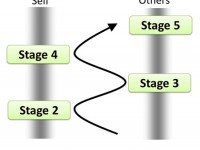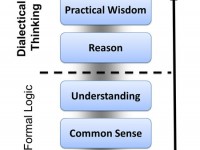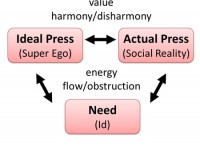The essence of the socio-emotional dimension has to do with how adults differ in making meaning of their life and work experiences based on their opposing and intertwined needs of being autonomous and being included in a community of others. These two lifelong tendencies achieve a different balance at every developmental “stage”. Social-emotional differences between people manifest not only in their “thinking”, but since thinking precedes acting, also in their goal setting, decision making, and, most directly, in the relationships individuals develop with others. In this life-changing course, students learn in depth not only the theory of social-emotional meaning making as developed by the Kohlberg School at Harvard, but acquire the practical skills of using what they learn, whether in making cogent assessments, giving cogent feedback, coaching, or consulting. Read More...
Tag: Development
Cognitive Development Toward Dialectic
The essence of the cognitive dimension of CDF has to do with how adults differ in making cognitive sense (rather than meaning) of their life and work experiences, thus with what they do and do not understand about the real world. These differences go far beyond “what is in the head” since how people construct the world conceptually precedes their actions in the world, and thus equally manifests in their activities, planning, goal setting, decision making, and execution of leadership functions. In most general terms, students learn to switch from “what” to think to “how” to think, thereby gaining fluidity of thinking based on an awareness of their present way of thinking that makes some things “unthinkable” to them. In this life-changing course, students gain insight not only into the theory of cognitive development and the development of dialectic, but also begin to apply dialectical thought forms in text analysis, in cohort discussion, and in coaching interventions with individuals and teams. Read more Read More...
Dimensions of Clients’ Psychological Profile
In CDF, a person’s psychological profile is determined by evaluating answers to Morris Aderman’s Need/Press Questionnaire, a construct-validated questionnaire used in talent management, performance management, and promotion since 1970. The questionnaire is available on line in English, German, French, and Spanish (www.needpress.com). Questionnaire outcomes ideally complement social-emotional insight deriving from semi-structured interviews. The questionnaire embodies Henry Murray’s personality theory which is based on the notion of psychogenic (inborn) needs and associated pressures as defining a individual’s personality. In NP, clients’ profile is viewed in terms of three foci: self concept, approach to tasks, and interpersonal perspective (emotional intelligence.). Discussing these behavioural clusters in class tremendously helps students distinguish between what is “social-emotional” (developmental) and “psychological” in their own and in clients’ behavior and way of working with others. Students learn to make fine behavioral distinctions and observations; they also learn how to give appropriate and complex feedback to clients, weaving psychological insights into feedback on clients’ present social-emotional frame of reference. In CDF, a person’s psychological profile is viewed as the “glue” that holds his/her competences together, and also as a filter through which adult developmental resources pass on their way to inform the use of competences. In this course,... Read More...
From “Developmental Theory” to a Dialogical and Dialectical Epistemology
By Otto Laske - In this text, I focus on the central relevance of interviewing skills for being able to lead a structured developmental dialog in the sense of the Constructive Developmental Framework (CDF), whether social-emotional or cognitive. I want to make it clear that the certification as a Master Developmental Consultant/Coach at the Interdevelopmental Institute (IDM) is not a certification in practicing “developmental theory”, but rather an independent discipline derived from it, namely, a dialogical and dialectical epistemology. Developmental theory per se is taught at IDM only in applied courses which serve as a basis for learning the CDF epistemology, and in this sense are mere teasers for learning to think and listen developmentally, dialogically, and dialectically. What matters is not the theory, but its applications in work with human resources (“human capital”). This has always been the focus of IDM teaching. Abbreviations: CDF = Constructive Developmental Framework (Laske); DCR = Dialectical Critical Realism (Bhaskar); DSF = Dialectical Schema Framework (Basseches); DTF = Dialectical Thought Form Framework (Laske); IDM = Interdevelopmental Institute (Laske). *** When I started writing my two books on Measuring Hidden Dimensions in 2005, it was clear to me that the most progressive part of Kegan’s... Read More...


